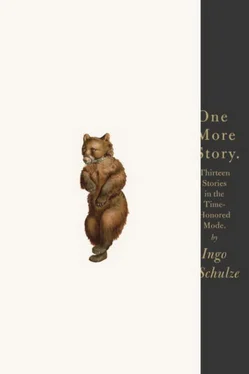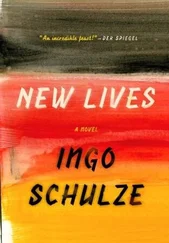I read my story, this is work, no longer Sunday, no more freedom, no more independence. I’ve deliberately kept the tone unliterary, as if I myself have had to write up the police report that never got written.
“Saint Petersburg, December 1, 2000. I was in the city to join my translator Ada Beresina in presenting the Russian edition of 33 Moments of Happiness at the Goethe-Institut and the university. For me it was a dream come true, because as I liked to boast during that week, my book was returning to its city and to the language of most of its characters. I was living in the Pension Turgenev on a side street off Upper Nevsky, not far from the Moika Hotel. I had exchanged money in a currency shop located below street level in an apartment house across from my own building, and so still had my passport. With wallet and passport in the inside breast pocket of my jacket and my little backpack slung over my shoulder, I strolled along the Neva, watched floes of ice passing in the water and thought of Vienna.…
“At the Marble Palace I left the Neva and crossed the Field of Mars, heading in the direction of the Nevsky. Standing around the Flame for the Unknown Soldier were several people I first took for soldiers. As I approached a young man said something to me. His body language was somehow servile — his gaze shifty, his face and hands grimy. He asked me the time. It was shortly after noon. He then asked me for money, he was hungry. I pulled out my wallet, gave him ten rubles, and moved on. Keeping to the right of the monument as I walked away, I noticed he called something over to the young men warming themselves at the Flame for the Unknown Soldier. In the next moment the pack was after me, half of them children. They were pleading, their hands clasped together as if in prayer, shouting, ‘Kushat, kushat!’ —eat, eat. I didn’t try to run away. After all, it was broad daylight, in the middle of St. Petersburg. Or maybe I didn’t think that, maybe I was just embarrassed. Make a run for it? I probably guessed it would have been no use. Even as some high-pitched voices went on whining their ‘Kushat, kushat!’ I could hear other low voices calling out to one another, agreeing on tactics. It was only then that I realized the situation I was in, and at the same time didn’t want to believe it. I stopped in my tracks. Barely a moment later they had the better of me. The strongest of them had jumped me from behind and now held me in a clinch, pinning my arms to my body.…
“I bellowed like I’ve never bellowed before. I bellowed like an ox, twisting, tossing back and forth like a wild boar, like a bear attacked by a pack of dogs. They were truly everywhere. Tucking my body, I held tight to my backpack. All that my wrenching back and forth accomplished, however, was that my glasses fell off, and I thought: All I need! When I looked up my eyes met those of a woman hurrying toward me. Her shame and my shame — there’s nothing more to say. A hand was thrust down into the breast pocket of my jacket, inching bit by bit for my wallet and passport. My jacket was buttoned, my coat, too, but no matter how loud I screamed and twisted and turned, the hand thrust forward, farther and farther, it wouldn’t have taken much and …”
The conductor is wearing a round cap. Uniforms without billed caps can’t be taken quite seriously. He smiles, lips like Belmondo’s, I smile and hand him my ticket, which he signs off on. We’re moving through Tatabanya now, an eagle painted on a rock face, some sort of hoist frame on a hill topped by massive ruins. The Danube on the other side almost makes up for it.
“Suddenly they let go of me, one after the other, I heard somebody cursing, the whole pack made themselves scarce. I got to my feet. Walking toward me was a man in a fur cap, a full net shopping bag in each hand. I reached for my wallet, checked to make sure I wasn’t bleeding, and picked up my glasses. I was all right.”
Here the real story begins, but the narrative flow starts to meander, since some explanations are needed for the reader to follow the miraculous turn that the incident is now supposed to take for me.
I had bellowed myself hoarse and at first could manage only a whisper, so my rescuer barely understood my thank-you, but traced his gloved forefinger along the vertical slit a knife had left on the right side of my coat. I asked him his name. “Gilles,” he said, “I’m French.” “Gilles?” I croaked in bewilderment.
Watteau’s Gilles was the favorite painting of my deceased friend Helmar, to whom 33 Moments is dedicated. The Russian edition is the only one in which his first name appears rather than just his initials. This is required information for anyone to understand why I was so thunderstruck by the name Gilles. On the day of my book’s publication, I had been rescued in the middle of St. Petersburg by a Frenchman named Gilles, almost as if Helmar … But of course I didn’t actually believe that.
Gilles insisted we look for a policeman. We found one outside the GAI station (the “State Auto Inspection,” as the traffic police are called in Russia) next to the Marble Palace. We shoe-horned ourselves into a GAI Lada and drove around a bit, but the kids, much to my great relief, had vanished into thin air. What would we have done with them anyway? The only items missing were a little dictionary and a lighter taken from an outside pocket of my backpack. They hadn’t punched me or kicked me or pulled my hair. A gutsy Gilles had sufficed to drive them off. When I spotted the Russian Museum through the window of the Lada, I realized that what had happened to me was something I had already described. “Have you ever seen anything like it, in the middle of the street, and kids right behind, two of them, and another, on a line with them, across the way, watching doorways, and then another, just ahead, along the railing … Müller-Fritsch lay half on his back, half on his side, against the canal railing.”
A few hours later as I was walking, escorted by a translator and an interpreter, through the pedestrian passage under the Nevsky that would take us from Sadko in the direction of Gostinny Dvor, I tossed some coins in the cap of a one-legged beggar, all the loose change I had in my pocket. I still recall how in some little nook of my heart I regarded this gesture — made more by way of overcoming my own inertia than of performing any sort of sacrifice — as an act of propitiation that would guard me from similar attacks in the future.
The beggar, however, called after me, in a tone of voice that didn’t sound like a blessing. When I turned around he was already swinging his one good leg between his crutches. I still assumed this was purely accidental. But once he set to work hopping up the stairs of the underpass after me, there could be no doubt. I barely had time to pull the door of the taxi shut, and there was the rubber tip of his crutch pounding against the windowpane. “We’ll walk,” Ada said — the cabbie had demanded an outrageous fare. “We’ll pay!” I cried, never taking my eyes off the rubber tip banging at the fogged-over window. At last the driver maneuvered toward the middle of the street. At the same moment I was convinced that — since this too resembled a scene in the book — I myself would now have to experience everything I had described in 33 Moments of Happiness . St. Petersburg was demanding its tribute for my stories. How could I ever have thought I would get away with it, and go unpunished for writing anything I wanted to write?
No sooner had we come to a stop at the end of a long line of traffic waiting for a light than Ada screamed. Flames were shooting out of the car to our left, its motor was burning. We ducked, I waited for the explosion. During those seconds I ran through the book in my mind. But nowhere had my fantasy gone so far as to set a car ablaze. It wasn’t my fault, this fire had nothing to do with me — I was overcome with relief. The taxi pulled away, and when we stopped again we were at least thirty or forty meters from the burning car.
Читать дальше












